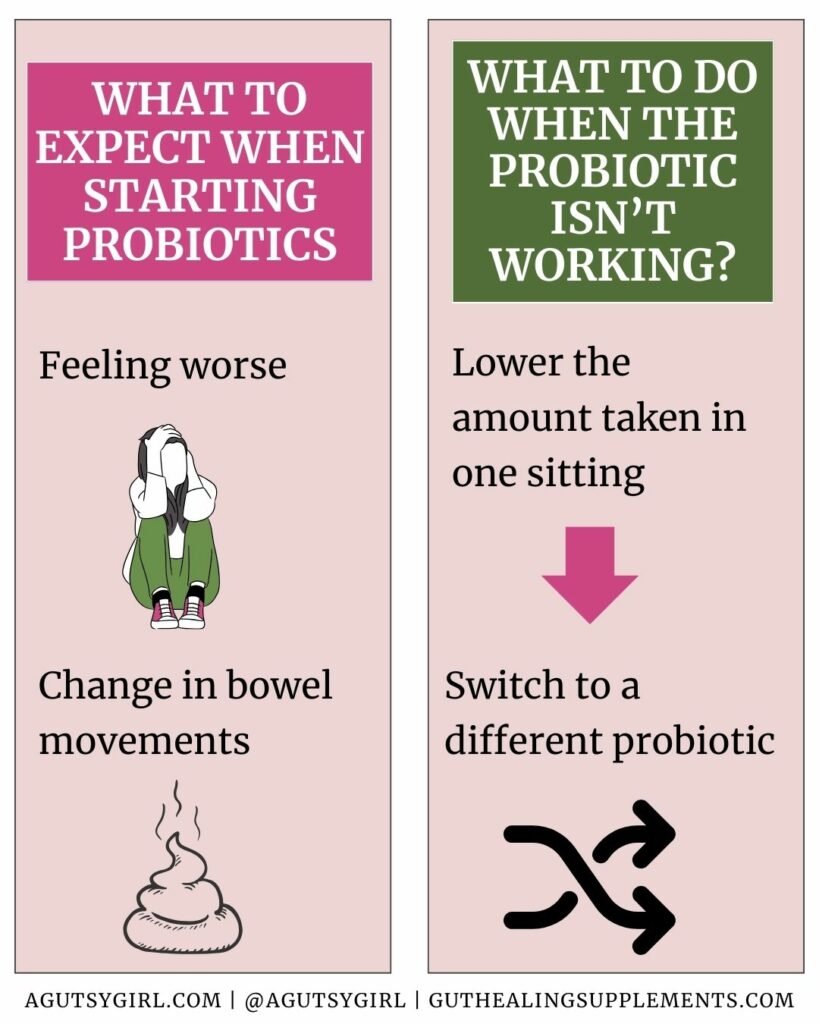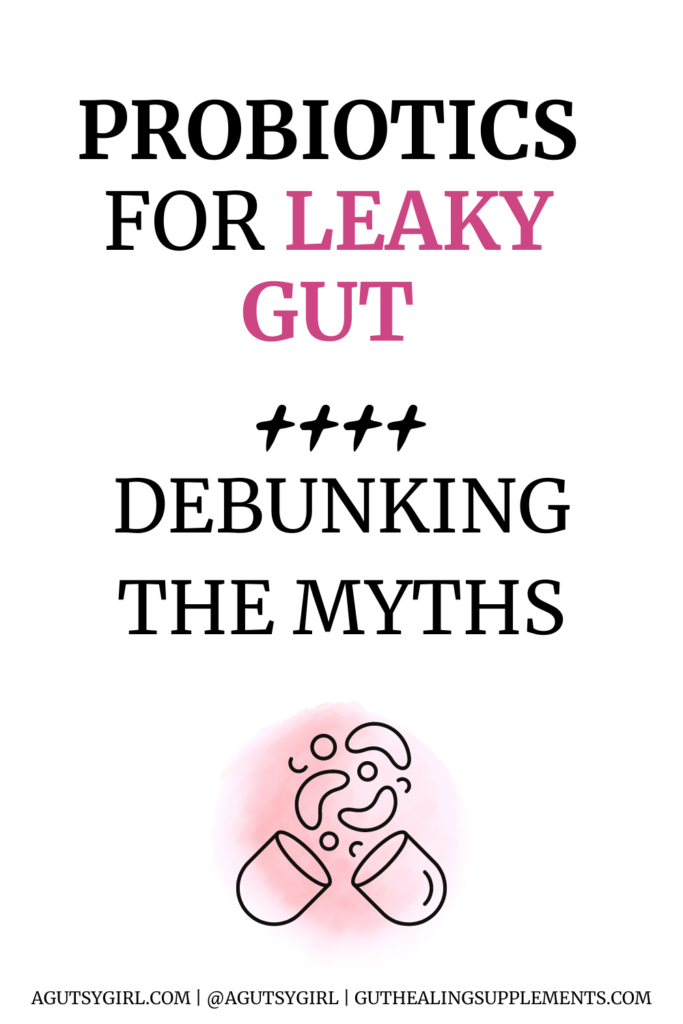Let’s chat about probiotics for leaky gut.
Here is how this post came to life.
What to Expect When Starting a Probiotic
I wrote a post on What to Expect When Starting a Probiotic.
And then I shared the graphic via Instagram (good old IG).

Upon posting it, someone commented,
Just wanted to share info about a new study that was published by the AGA (American Gastroenterology Association) this summer showing that probiotics are not useful for IBS/IBD.
This year the American Gastroenterology Association (AGA) published their recommendations on use of probiotics for gut health. As well as rigorously reviewing the evidence, they considered submissions from patients and interested parties.
Their evidence-based recommendations show that probiotics are not yet ready for prime time.
Of course that set off a spiral of thoughts (by me) and anger (by others).
So I wanted to investigate.
Here is what I discovered.
Probiotics: Promise, Evidence, and Hope
I’d be almost willing to bet that THIS article via the American Gastroenterology Association (AGA) is what she was referring to.
So for starters, let me share some interesting points / thoughts stated within the article.
Big Business
- In recent years, the public consumption of probiotic products may have also benefited from the steady gush of headlines about the importance of the microbiome in human health and its roles in many diseases. By 2023, the industry’s yearly global sales are projected to reach approximately US$70 billion.
- Unfortunately, the public receives little help in distilling reliable information from the barrage of messages and promises.
What’s Beneficial?
- The notions of “beneficial” microbes originated more than a century ago in the Pasteur Institute on the heels of the emergence of the germ theory of disease, which linked many of the most common maladies of the time to specific microbial pathogens. (AGG note: See more about the Germ theory of disease HERE.)
- However, over the past 25 years increased understanding of mucosal immunology and epithelial biology has opened new avenues of research into the presumed benefits of the main bacterial genera used in probiotics (eg, Lactobacillus sp, Bifidobacterium sp, Streptococcus sp).
- In model systems, probiotics have been shown to modulate the immune system, provide resistance to invasion by pathogens, improve intestinal barrier function, lower the pH of the gut, and modulate intestinal motility and pain perception.
- Yet, despite a number of animal studies showing how probiotic bacteria can alleviate diseases ranging from autism to osteoporosis, translation of these findings into human clinical trials that has efficacy has been slow to emerge (visit Precision for Medicine to see what the procedure of a clinical trial is). The most likely reasons for lack of progress include scant high-quality human clinical trials, scientific misconceptions, and absence of appropriate regulation of probiotics.
- One critical fact that has muddled the field is the lack of recognition that many functions of bacteria are specific to the strain, not the species.
- A common notion that probiotics “balance” the intestinal microbial composition is almost certainly wrong.
Study Findings
- Notably, most of the probiotic strains available on the market today are not adapted to the environment of the human intestine.
- First, the Institute found moderate evidence that probiotics do not reduce the duration or severity of diarrhea in children with acute infectious gastroenteritis.
- However, only a minority of the studies tested strains of Bifidobacteria suggested by Tissier. In contrast, there was moderate to high level of evidence that probiotics containing different strains of Lactobacillus and Bifidobacterium genera were beneficial in preventing necrotizing enterocolitis, the most frequent and devastating gastrointestinal disease in preterm, low birthweight newborns and mitigating its complications.
- Personalized medicine is likely to be critical for many indications, and we will need methods to choose the best therapeutics for specific indications and individual patterns of dysbiosis; however, some indications may be amenable to very targeted mechanism-based therapeutics, some of which may not even be formulated with live microorganisms.
- Despite the many pitfalls, we expect that next-generation probiotics have an important role in the future of human health and prevention of disease.
Not All Probiotics are Equal
So here’s the deal.
The article is both right and also a little misleading.
What They Got Right
Big business
Yes, absolutely.
“By 2023, the industry’s yearly global sales are projected to reach approximately US$70 billion.”
There is no hiding the fact that the probiotic industry (and supplements in general) are a huge business.
Personalized medicine
The article states,
Personalized medicine is likely to be critical for many indications, and we will need methods to choose the best therapeutics for specific indications and individual patterns of dysbiosis.
This is true. There is no denying that.
However, I do wonder what the AGA thinks about giving a drug like Canasa or Prednisone to almost all UC patients?
Is medicine still personal then?
What is Misleading
The studies include only lactobacillus and bifidobacteria strains
A conclusive probiotic conclusion cannot be made using only two strains when those two don’t even cover the tip of the iceberg.
Also, in May of 2016 at a panel discussion at UCLA consisting of two research microbiologists and Sandor Katz, author of the extremely popular DIY fermentation book, Wild Fermentation, these two strains were discussed.
All three agreed that the bacteria in both fermented foods and commercial lacto/bifido probiotics were virtually entirely killed by bile and stomach acids. (source)
It’s the American Gastroenterology Association
What that means is that they have no vested financial interest in probiotics.
If a gastroenterologist recommends a probiotic, it’s a simple recommendation; it’s not a prescription.
Furthermore, if this was a pharma industry-paid study that wants to show conventional probiotics don’t produce benefit, THEN they use the weak commercial strains from off the shelf (versus the uniquely powerful, single strains that are only available to researchers and not the general public in any off-the-shelf probiotic).
The “lack” isn’t necessarily a correlation
The AGA states,
Yet, despite a number of animal studies showing how probiotic bacteria can alleviate diseases ranging from autism to osteoporosis, translation of these findings into human clinical trials that has efficacy has been slow to emerge. The most likely reasons for lack of progress include scant high-quality human clinical trials, scientific misconceptions, and absence of appropriate regulation of probiotics.
This might be misleading because there is an entirely separate issue with the lack of high-quality human clinical trials.
Why would the AGA, drug companies, or anyone else (but the supplement companies themselves) have interest in putting forth millions of dollars for these studies when there is no direct benefit for them?
So then what happens?
The supplement companies are the only ones trying to conduct a lot of research. These companies are oftentimes startups without millions of dollars to spend on research.
And without critical research, the studies they are able to conduct, are not taken seriously.
Do you see the problem with this?!
In fact, if you really want to dig more into this, listen to this interview with Microbiologist Kiran Krishnan.
Make special note of the following:
- 3min: When seeking expertise on probiotics and the gut microbiome… choose gastroenterologist or a microbiologist?
- 7:45min: Why the FDA does not allow a study on disease outcomes comparing the effectiveness of a drug versus a nutritional supplement.
- 11min: Probiotics cannot get a legal recommendation unless WHAT happens first?
The Truth About Studies and Reviews on Probiotics
These are things I have alluded to above.
Probiotics for Leaky Gut
Click HERE to save this post for later.

So, let’s return to the main topic at hand today; probiotics for leaky gut.
I believe the best probiotic for leaky gut is the Just Thrive Probiotic. And I’ve already written about it HERE.
But here are three specific reasons:
- Research
- Trust
- Next generation thinking
Research
Due to the research against probiotics presented above, I wanted to share some more research to support this other side.
- Oral spore-based probiotic supplementation was associated with reduced incidence of post-prandial dietary endotoxin, triglycerides, and disease risk biomarkers
- Bacillus coagulans (found in the Just Thrive Probiotic) is a probiotic bacterium that produces spores. Due to its excellent stability, you’ll find it in medicine, food and chemical industry. Recent studies have shown that B. coagulans has therapeutic effects on intestinal diseases, such as acute diarrhoea, irritable bowel syndrome, antibiotic-related diarrhoea, constipation and colitis via modulation of the microbiota composition, host immunity and metabolism. source
- Two isolates of B. subtilis examined here were HU58, a human isolate and PXN21, a strain used in an existing commercial product. Compared to a domesticated laboratory strain of B. subtilis both isolates carried traits that could prove advantageous in the human gastro-intestinal tract. source
Who Do You Trust?
Besides research, I believe Just Thrive Probiotics are the best for leaky gut because I trust them.
The AGA article states,
Unfortunately, the public receives little help in distilling reliable information from the barrage of messages and promises.
Again, there is no denying that fact.
So, you either have to know a ton about probiotic strains and species and your own body or you have to know your own body and trust a brand or someone telling you to take said brand.
Why do I trust Just Thrive?
Because I’ve met many people from the company, including Microbiologist Kiran Krishnan who is behind the probiotic formulation.
Next Generation Probiotics
Finally, the AGA states,
Despite the many pitfalls, we expect that next-generation probiotics have an important role in the future of human health and prevention of disease.
Honestly? I believe that Just Thrive Probiotics are next generation.
I mean, they even have a Just Pets Probiotic that is clinically proven and effective spore probiotic to help your furry friend feel their best.
Seriously, check out these 8 Signs Your Dog Has Leaky Gut.
How is that for next generation?!
In addition to those three reasons, you can find reasons for the Just Thrive Probiotic based on their individual ingredients.
Here is one.
Bacillus Subtilis (B. Subtilis):
- Supports gut repair by increasing IgA and butyrate
- Produces over 12 antibiotics
- Ferments Vitamin K in your gut, which is essential for growth and repair
- Has a positive impact on inflammatory and autoimmune markers
- Widely used, safe, and effective

And by the way, I didn’t even pull that information from Just Thrive. It came directly from Dr. Amy Myers. Dr. Amy also confirms through her article that many of the ingredients in the Just Thrive Probiotic are good for those with SIBO, too.
If you liked this post on probiotics for leaky gut, you might also enjoy:
- Leaky Gut Diet Recipes
- How Long Does it Take to Heal Leaky Gut
- A Gutsy Girl’s Master Resource Spreadsheet {FREE resource}
Disclosure: When you purchase Just Thrive via any of the links in this post, I am paid a small affiliate commission. All opinions stated here are 100% my own. I appreciate your support. This compensation helps with expenses to keep the website up and running. And, of course, this allows me to continue sharing all that I can with you. For my full disclaimer and disclosure click HERE. Thank you for your support!
Xox,
SKH
🤰 bloating be gone! weight loss through optimal gut health for women
💃ʜᴇᴀʟ ʏᴏᴜʀ ɢᴜᴛ. ʜᴇᴀʟ ʏᴏᴜʀ ʟɪfe.
🫶🏻 founder gutbyome.com







I so want probiotics to work for me but I have not had any luck with them. They have done nothing to improve my gut health. Not sure if it’s because I can’t seem to get my SIBO (Methane positive) in check or not. I’ve tried so many different brands I literally gave up on them.
Read my post on probiotics and SIBO…..it might help 🙂 Hugs.